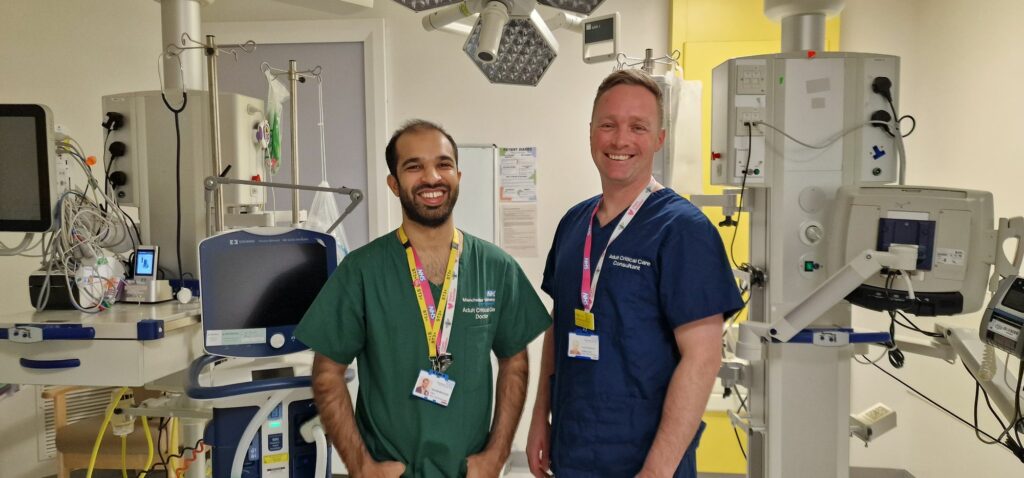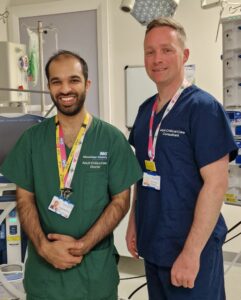Manchester University NHS Foundation Trust (MFT) Critical Care Consultant, Jonathan Bannard-Smith shares his experiences of mentoring an aspiring Principal Investigator (PI) through the National Institute for Health and Care Research (NIHR) Associate Principal Investigator (API) Scheme.

The API scheme is a six month in-work training programme which provides the opportunity to lead on and deliver an NIHR portfolio trial under the mentorship of an experienced Local Principal Investigator, (a Principal Investigator based within the API’s site/trust, legally responsible for the study).
Dr Bannard-Smith is a Consultant and Clinical Lecturer in Critical Care Medicine, and Lead for Clinical Research in Critical Care at Manchester Royal Infirmary (MRI). He has worked within research for 12 years and began his journey at MFT 10 years ago.
Explaining his reasons for participating in the programme, Jonathan said: “During my postgraduate training, there were no formal opportunities for training as an aspiring PI. Taking on the PI role as a new consultant revealed many learning needs beyond those covered by the standard Good Clinical Practice (GCP) training package. I therefore welcomed the launch of a formal training programme aimed at those considering a future position as PI for a study.
“As a Chief Investigator and local research lead, I have been pleased to see how the API programme has provided a structured training opportunity for my junior colleagues to engage their interest, development and provide them with a tangible package of training.”
In December 2023, Naeem Meghjee, Speciality Trainee (ST8) Doctor in Intensive Care Medicine and Acute Internal Medicine, joined the API scheme under Dr Bannard-Smith’s mentorship. Naeem has worked at MFT for 15-months and has had previous exposure to research through collaborative projects and involvement in clinical trials, however this is his first formal role as an Associate Principal Investigator.
Naeem has led and delivered on the MFT-sponsored study SWIPE 2 – comparing two different fluids aimed to improve blood flow in patients with the most severe form of infection, known as septic shock. The aim of this feasibility study is to demonstrate that a trial like this can be conducted in NHS critical care units.
Recruitment is taking place at intensive care units on two MFT sites, MRI and Wythenshawe Hospital. Throughout this trial, researchers will collect vital data to support upscaling and funding a UK wide study to find out whether any one of these fluids results in better survival for patients with septic shock.
 Naeem said: “I chose to take part in the API programme because I wanted to have an active role in a clinical trial and insight into what it means to be a PI.
Naeem said: “I chose to take part in the API programme because I wanted to have an active role in a clinical trial and insight into what it means to be a PI.
“In addition to equipping me with the skills to become a future PI, the main benefit I have found from being part of the API programme is the opportunity to collaborate with experienced researchers and mentors, which has enriched my understanding of research methodologies and data analysis. Furthermore, the research I am involved in has the potential to directly benefit patient care by informing clinical practice and guiding the evidence-base in intensive care settings.
“I would encourage anyone interested in the API scheme to proactively seek out research opportunities early in their careers. Learning from mentors who can provide guidance and support in navigating the complexities of clinical research is invaluable and provides a greater advantage, the earlier it can be done.”
APIs receive formal recognition of engagement in NIHR Portfolio research studies through the certification of Associate PI status, endorsed by the NIHR and Royal Colleges.
Dr Bannard-Smith found that the API Scheme has raised awareness of research amongst their colleagues in the department. This has moved critical care research from being a novel, rare occurrence to being part of usual care for all our patients.
Discussing his overall experience, Jonathan said: “For anyone interested in the scheme, take this opportunity to gain some formal, structured and mentored training around the leadership and delivery of clinical research. It provides an honest taster to the PI role and a strong foundation on which to launch your career interest in clinical research.
“It has been a great experience to mentor Naeem through this programme and I hope he will continue with his interest in clinical research and take on the role of PI in the future.”
MFT hosts one of the largest and most diverse NIHR portfolios in the country, comprised of; NIHR Manchester Biomedical Research Centre, NIHR Manchester Clinical Research Facility, NIHR Clinical Research Network Greater Manchester, NIHR Applied Research Collaboration Greater Manchester, and the NIHR HealthTech Research Centre in Emergency and Acute Care (launching April 2024).
As one of the top recruiters to clinical research studies in the UK, it is at the cutting-edge of healthcare research, innovation, and life sciences, delivering R&I across MFT’s 10 hospitals and local care organisations.
Visit the NIHR website to read more about the API Scheme and how to get involved.